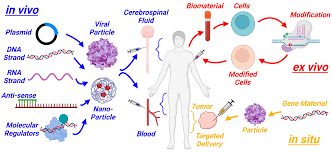In the realm of medical science, a groundbreaking innovation has emerged: a revolutionary gene editing technique that holds immense promise in the treatment of genetic disorders. This cutting-edge technology represents a paradigm shift in our approach to combating inherited diseases, offering hope to millions worldwide. Join us as we explore the intricacies of this revolutionary gene editing technique and its potential to transform the landscape of healthcare.
Understanding Genetic Disorders
The Genetic Basis
Genetic disorders arise from mutations or abnormalities in an individual’s DNA. These mutations can lead to a wide range of health conditions, from rare inherited diseases to more common disorders such as cancer and diabetes.
Challenges in Treatment
Treating genetic disorders has long been a formidable challenge for medical researchers. Conventional therapies often target symptoms rather than addressing the underlying genetic cause, leaving patients with limited treatment options and a reduced quality of life.
Introducing the Revolutionary Gene Editing Technique
Overview of Gene Editing
Gene editing is a process that involves precisely modifying the DNA of an organism. The revolutionary gene editing technique takes this concept a step further, allowing scientists to target and correct specific genetic mutations with unprecedented accuracy.
Key Components
At the heart of this technique is a specialized tool known as CRISPR-Cas9, which acts as molecular scissors, allowing scientists to cut and edit DNA sequences with remarkable precision. Coupled with advanced delivery systems, this technology enables targeted edits to be made directly within a patient’s cells.
Potential Applications in Treating Genetic Disorders
Correcting Disease-Causing Mutations
One of the primary applications of the revolutionary gene editing technique is the correction of disease-causing mutations. By precisely editing the genetic code, scientists can eliminate or repair faulty genes, offering the potential for a permanent cure for genetic disorders.
Personalized Medicine
The ability to tailor treatments to individual patients based on their unique genetic makeup represents a significant advancement in personalized medicine. This approach holds promise for improving treatment outcomes and reducing adverse effects.
Challenges and Ethical Considerations
Off-Target Effects
While the revolutionary gene editing technique shows great promise, concerns remain about off-target effects—unintended changes to the DNA sequence that could have unforeseen consequences. Mitigating these risks is essential to ensuring the safety and efficacy of gene editing therapies.
Ethical Implications
The ability to manipulate the human genome raises complex ethical questions regarding the boundaries of scientific intervention and the potential for unintended consequences. Robust ethical frameworks are needed to guide the responsible use of gene editing technologies.
The revolutionary gene editing technique represents a monumental leap forward in the field of genetic medicine. By harnessing the power of CRISPR-Cas9 and advanced delivery systems, scientists are poised to revolutionize the treatment of genetic disorders, offering hope to millions of individuals affected by these conditions. As research continues and technology evolves, the potential for gene editing to transform healthcare is truly remarkable.




